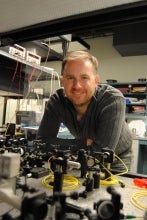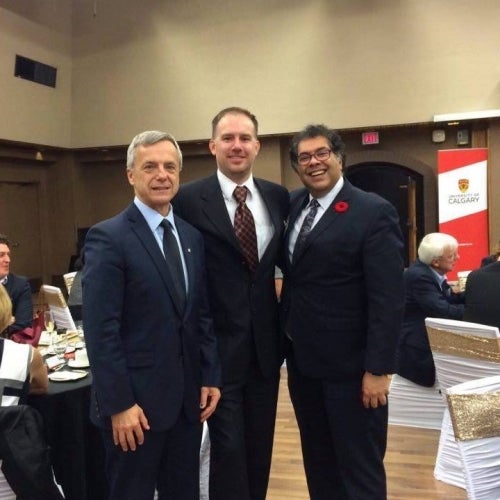 Neil Sinclair (BSc ’07) took his co-op placements into his own hands while a student at the University of Waterloo, seeking a position that he hoped would expand his interest in physics by sending mass emails out to leaders in the field who might be willing to take him on as an apprentice.
Neil Sinclair (BSc ’07) took his co-op placements into his own hands while a student at the University of Waterloo, seeking a position that he hoped would expand his interest in physics by sending mass emails out to leaders in the field who might be willing to take him on as an apprentice.
Not only did someone reply but Professor and Director of the Institute for Quantum Science and Technology (IQST) at the University of Calgary, Barry Sanders, took Neil under his wing as his co-op student propelling Neil’s future career in the field of quantum physics.
Alumni Relations caught up with Neil to talk about his journey and his life after Waterloo.
-----------------------------------------------------------------------------------
Working as a co-op student for the director of IQST in Calgary seems like the perfect opportunity for someone interested in quantum technologies. Tell us about your role with Professor Barry Sanders.
I was employed to develop computer animations that illustrate quantum physics experiments to non-scientists. These experiments represent the first steps toward the realization of quantum technologies that could shape the future in important ways.
The work also inspired a creative side in me that I hadn’t tapped into since high school art class. It is tough to portray a photon (a single quanta of light) without bending the laws of science a bit. We went as far as developing 3-D immersive animations at the renowned Banff Centre for the Arts. Barry hired me knowing that I was a science educator at the Ontario Science Center during my previous co-op placement so he figured I could potentially be a decent communicator of science.
How did your placement help you decide on your future career aspirations in quantum science?
You know, a co-op placement actually gave me the time to think about the future. During class terms, we are studying a lot and interviewing for future co-op placements without much time for anything else. A work term allowed me to sit back and re-assess the meaning of my class content instead of focusing on finishing an assignment on time. Furthermore, my placement helped me become more interested in the impact that physics has on us, while at the same time, the non-intuitive predictions of quantum physics that I learned about allured me.
You had another great opportunity in your second placement while at Waterloo working with Shohini Ghose, a renowned physics professor. Can you tell us a bit about this?
I was lucky enough to meet Shohini while she was a post-doctoral scholar in Barry’s group. Since then she became a professor at Wilfrid Laurier University, and an adjunct professor at UWaterloo. For my next co-op, she gave me the opportunity to work on research relating to quantum entanglement, a topic that I became interested in during my time in Calgary.
With her guidance, we were able to better understand what entanglement is and how it can be harnessed in powerful ways. Plus I was able to attend workshops at the Perimeter Institute, and mentor younger students.
You now work as a researcher at the University of Calgary. Can you tell us about the work you are doing there?
Interestingly, I build similar experiments to those that I portrayed in my animations. I work under the guidance of Professor Wolfgang Tittel, who is a leader in quantum communication science, developing potential components for a future quantum internet. Specifically, I study atoms in solid-state crystals and entice them to manipulate information that is carried by single particles of light. At the same time, I am making (small) discoveries that help us understand how nature works.

You work on a research project funded by the Defense Advanced Research Projects Agency (DARPA) with the United States Department of Defense. Can you tell us a bit about that?
Sure, and in case you’re wondering, I’m not sworn to secrecy. One goal of our lab is to develop information-secure networks, in which security is guaranteed by the laws of quantum physics. This is important because future computers may be able to hack today’s security protocols. Naturally, governments and security agencies are interested in things like this. In the end, this meant that I was sent to Washington to participate in some of the meetings with DARPA agents, which was pretty cool.
What were the biggest impacts the University of Waterloo had on your career?
It helped prepare me for the next steps of my professional and academic life. I would also say that the physics department wants you to do well, and pushes you to do so. The lecture materials are diverse and challenging, there are a lot of great experimental courses, and the co-op program offers a connection to the job market. A lot of other graduates that I know have found their way to success.
What does it mean to you be a part of an institution celebrating 60 years of innovation? What do you see for the next 60 years at the University of Waterloo?
I am proud to be a part of, and carry on, the continued legacy of UWaterloo, especially so given that I convocated in UWaterloo's 50th year. I believe that, with the proper support, UWaterloo will continue to do what it does best - foster new innovations while at the same time introducing young minds to new thoughts and ideas that will give further purpose to their lives and shape our world for the better.




